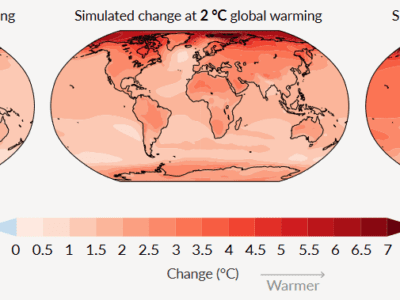Biden Should Declare a National Climate Emergency
The Inflation Reduction Act is working after one year, but it’s not enough. Pres. Biden could supercharge the IRA with more executive action.

People love anniversaries. Or journalists do anyway. So, we’re seeing a lot of news stories assessing the Inflation Reduction Act, which Pres. Biden signed on Aug. 16, 2022.
One year on, we have a clearer picture of what we vaguely knew already: the biggest-ever climate law and its robust tax incentives is igniting the clean energy transition but is not moving us off fossil fuels fast enough. Amplified by the dangerous, record-breaking July heat, we’re waking up to the realization that the IRA is not going to carry us across the finish line in the race to climate safety.
The Inflation Reduction Act is not nearly enough.
A few sectors are seeing the most progress. As William Boyd, Mary Nichols, and Julia Stein told me, clean energy manufacturing, renewable energy projects, EV sales and EV charging infrastructure are early success stories.
“The full suite of current policies on the books as of June 2023 drives U.S. emissions to 32-51% below 2005 levels in 2035,” reads the latest “Taking Stock” report from the Rhodium Group, an independent research firm. “The U.S. will achieve a 29-42% reduction in GHGs in 2030—a meaningful departure from previous years’ expectations for the US emissions trajectory, but not enough for the US to meet its pledge under the Paris Agreement to reduce emissions by 50-52% below 2005 levels by 2030.”
These emissions reductions under the IRA will not be enough, and there’s some uncertainty that they will come to pass. Reaching the 42 percent pathway depends on the herculean task of the U.S. adding 32-92 gigawatts of wind and solar on average every year from now until 2035, according to the Rhodium Group. “Achieving this level of growth is likely to face non-economic headwinds, including limitations on transmission build-out, the potential for local opposition and other siting and permitting issues, and supply chain constraints.”
The policy question that should keep you awake at night is this: What are the fastest ways to bridge the gap and cut through the “non-economic headwinds” that threaten our climate goals? That’s a political question as we approach an election year and that’s where I’m going to start.
Pres. Biden should declare a national climate emergency. Knowing that journalists love anniversary stories, I think there’s a case to be made that, sometime between now and Aug 16, as he makes his swing through the southwest, Pres. Biden should walk up to the podium and say, “Look folks, here’s the deal,” and finally declare that climate change is a national emergency. Heck, do it at a hospital in Phoenix. Do it now while people still remember what it’s like to suffer 31 days of temperatures above 110-degrees.
What would declaring a national emergency do?
As Dan Farber wrote back in 2022 (before the IRA was a thing), this kind of national emergency would probably be found legal and would definitely unlock significant powers. The possible climate actions the president could take include: stopping some oil and gas drilling; halting crude oil exports; cutting off some trading and investment in fossil fuels; further expanding manufacturing for clean energy technologies; constructing more renewable energy systems in targeted areas.
The Brennan Center identified no fewer than 136 statutory powers that could be part of a president’s toolbox after declaring a national emergency. As noted in great detail in this Climate Emergency Powers Report by Maya Golden-Krasner and Jean Su at the Center for Biological Diversity, the president’s most significant powers to effect climate action come under three statutory emergency and national defense frameworks: the National Emergencies Act (“NEA”); the Defense Production Act (“DPA”); and the Robert T. Stafford Disaster Relief and Emergency Assistance Act (“the Stafford Act”). Biden could, they say, reinstate a relatively popular ban that was in place for years until 2015 by unilaterally banning all crude oil exports. According to their analysis, Biden could also select one of several pathways to phase out offshore oil drilling. These pathways include directing the Secretary of the Interior to suspend all operations of offshore drilling under Section 12(c) of The Outer Continental Shelf Lands Act (“OCSLA”), which contains a national security clause. The report also contends that Biden could restrict fossil fuel trade and curb investment in fossil fuel infrastructure abroad pursuant to his powers under NEA and the International Emergency Economic Powers Act.
A national emergency could target the real culprit.
The oil and gas industry is not yet sweating the competition from clean energy. Even though there are plenty of market incentives in the Inflation Reduction Act intended to move us toward clean energy (carrots), there are no punitive measures to push down dirty energy (sticks). In fact, the oil and gas industry got some goodies in the form of hydrogen hubs and the like.
In any case, the point of unlocking certain emergency powers would be to supplement (not duplicate) what the IRA is already doing or what the Biden administration is already trying through regulatory actions.
To be sure, something has lit a fire in Washington. In the last couple weeks, the Biden administration has moved to tighten fuel-efficiency standards through NHTSA, announced a heat plan, finalized new rules at FERC to quickly link clean energy to the grid, proposed permitting reforms to environmental reviews, and launched a methane task force. All of these efforts should be pursued vigorously. Plugging methane leaks is especially important, given that the vast majority (87%) of methane emissions are not covered by any mitigation policies. And recent research from the Rocky Mountain Institute finds that leakage as low as 0.2% puts “natural gas” on par with coal. But stop for a moment and think about how ludicrous it is that the White House would have to form a task force to try and prod an industry to detect leaks in its supply chain that literally wastes its own product into thin air? Something’s not working.
This recent buzz of activity in Washington represents what the Biden administration has called its ‘whole of government’ approach to climate change. There are just two problems: (1) it’s a slow grind; and (2) there are too many exceptions and contradictions that allow the fossil fuel industry to chug along. The Biden administration has famously made decisions to allow major oil drilling projects because of possible lawsuits (the Willow project in Alaska) and political dealmaking (Mountain Valley Pipeline) that are at odds with the rest of its climate policies.
Declaring a federal emergency could help end the internal debate that is dividing the Biden administration between climate policies and diplomatic relations. Most recently, the U.S. Export-Import Bank weighed whether to grant $100 million in financing to renovate an old oil-refinery in Indonesia. Senior climate aides urged no while other agencies said yes as a way to boost Indonesia at the expense of China. A clear mission statement from the White House would make it much harder to grant exceptions to the administration’s climate policy. It could also provide political support for congressional hearings on ExxonMobil, Shell and others for their coordinated campaigns of climate deception. Nothing in the IRA provides any accountability for the main source of global-warming pollution. A national emergency would take on the industry in a way that the mounting caseloads of climate litigation simply cannot do urgently because of the time these cases take to move through the courts.
Declare a climate emergency now, because it is one.
For one thing, it is an emergency by any other name and most Americans know it. The U.S. has already experienced 12 separate one-billion-dollar climate-related disasters this year, according to the National Oceanic and Atmospheric Administration. More than 120 million Americans were just living under heat advisories; another 41 million were sweating under excessive heat warnings. This is a visceral moment from Phoenix to the Florida Keys. This is a national security crisis wound up with a public health crisis inside of an international crisis. If the H1N1 Influenza Pandemic and immigration at the U.S. border qualified, this is an easy call.
As for whether it’s good politics, that’s tougher. Deciding to use any particular executive action at the president’s disposal under emergency powers would be controversial and consequential, but the act of declaring an emergency doesn’t have to be. Biden is going to be running for reelection on the success of his signature law to rescue the economy and the planet. Any Republican nominee is going to be running on rolling it back. Wouldn’t it help if could tell the American public he was determined to get the nation over the finish line rather than tap out a mile from the end? Anyway, the IRA messaging still is not working. New polling shows that 57% of Americans disapprove of Biden’s handling of climate and most don’t know anything about the IRA.
Another reason is unity of purpose. The climate movement is approaching a breaking point where environmental justice advocates and clean energy advocates are not singing from the same songbook and it threatens to splinter the broad coalition. As my colleague Prof. Jim Salzman has put it: “The unprecedented scale and urgency of required climate infrastructure requires reconsidering the trade-off set in the 1970s between environmental protection and infrastructure development.” Declaring a national emergency, as many progressive Democrats in Congress have called for, could go a long way to repair that rift. (While it’s true that circumventing environmental reviews under a national emergency would be seen as a loss to environmental justice advocates, none of the scenarios imagined by the CBD analysis talk of suspending community input.)
We now know several things we did not in August of 2022 when Biden signed the climate law. We know with more precision just how far off track we are, even with the IRA. We know with absolute certainty that fossil fuel companies are dead set on reaping record profits, downscaling their climate pledges, and lobbying to fight the clean energy transition that’s underway. We know that the clock is ticking faster than we imagined. The IRA, though working, is helpless on all these fronts. It’s a smart law based on carrots. But it’s time to pick up the sticks.







Reader Comments